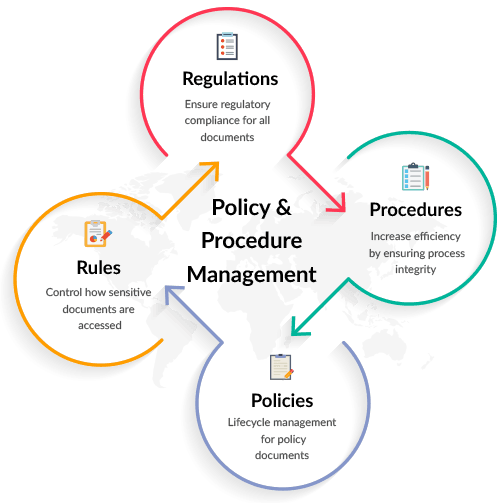Home/ Blog / Increase Operational Efficiency and Productivity with Better Business Policy Management
Business policies are an important tool to ensure that the business operates at maximum efficiency. Written in these policies is the blueprint for the whole organization’s expected behavior, role, and reporting. Properly defined and explained business policies can result in smoother operations, because everyone understands their own responsibilities and how to deal with the many problems and issues that occur in a workday. Poorly defined business policy, on the other hand, can result in confusion and productivity losses.

The Importance of the Right Business Policy
Startups and small companies usually do not focus on business policy because their operations are directly under the supervision of the leader of the organization. If there are only 10 employees, it is easy for the owner or CEO to ensure that everyone is following the proper business processes. The CEO can personally intervene wherever needed and is always available to provide guidance if needed. This situation is not sustainable as the business grows. There comes a point when the CEO has to ensure that their vision is being carried out even in their absence. That is the goal of business policy – to clearly define everyone’s roles and responsibilities so there is no confusion. If any problem occurs there should be no confusion about who needs to solve it and who needs to be told about it. A well written policy will include clear directions and rules for all recurring situations. Another major advantage of a well-written business policy is that it increases productivity. In the absence of a policy whenever employees are confused, they contact their manager for clarity. A business policy outlines which decisions the employees can take themselves and which decisions require approval or input from the manager. This decreases the breaks in the work process because the employees don’t have to wait for their busy manager’s time unless it is absolutely needed.

Good Business Policies are Living Documents
Business policies are not set in stone. They are living documents that change and adapt according to the needs of the business and changing business processes. The business environment is too dynamic now for a policy to be valid for more than a year. Since the business policy is the blueprint for organizational behavior it is important to ensure that it accurately reflects the business realities faced by the employees. If the policy documents get outdated, they can no longer be followed. Outdated business policies result not just in productivity losses and confusion but also in increased litigation risks. If the business did not make the rules clear, then the business is responsible for any problems that occur. If an employee makes a mistake or acts in an unethical manner and an investigation finds that the business had never made the right process clear in any written policies or documents, then the business was liable for the problem that occurred. The penalties in such cases grow exponentially if the business is found to lack the infrastructure to deal with the problem itself. If the business policy adequately explains the right business process, then the business can make the case that the employee in question acted against the clear directives of management. Business policies are an important tool to ensure that the business operates at maximum efficiency. Written in these policies is the blueprint for the whole organization’s expected behavior, role, and reporting Share on XManaging Business Policies
Creating the right business policies is just the first step towards policy and procedure management. Once the documents have been created, they need to be shared with the whole organization. These documents need to be easily available for referencing whenever an employee needs information. These documents also need to be protected to ensure that only authorized people can edit them and if any edits are made there needs to be an audit trail. The lifecycle of business policies also needs to be managed. Every policy document should be given an expiry date. When this expiry date arrives the document needs to be reviewed and assessed. If any parts of the document are outdated, they need to be updated. All these features are core components of document management systems. For more benefits that policy and procedure management can bring to your organization, read our white paper titled Reasons to Use Policy and Procedure Software. If you want to manage your business policies with proper document lifecycle management, get in touch with the 360factors team. The Predict360 Document Management module has been designed specially for managing policies and procedures and our team will be able to demonstrate the business benefits it can provide to your organization.
About the Company
360factors, Inc. (Austin, TX) helps companies improve business performance by reducing risk and ensuring compliance. Predict360, its flagship software product, vertically integrates regulations and requirements, policies and procedures management, risks and controls, audit management and inspections, and on-line training and qualifications, in a single cloud-based platform based on artificial intelligence. Remain up-to-date on industry news/updates through our Twitter & Linkedin profiles.Request a Demo
Complete the form below and our business team will be in touch to schedule a product demo.
By clicking ‘SUBMIT’ you agree to our Privacy Policy.



